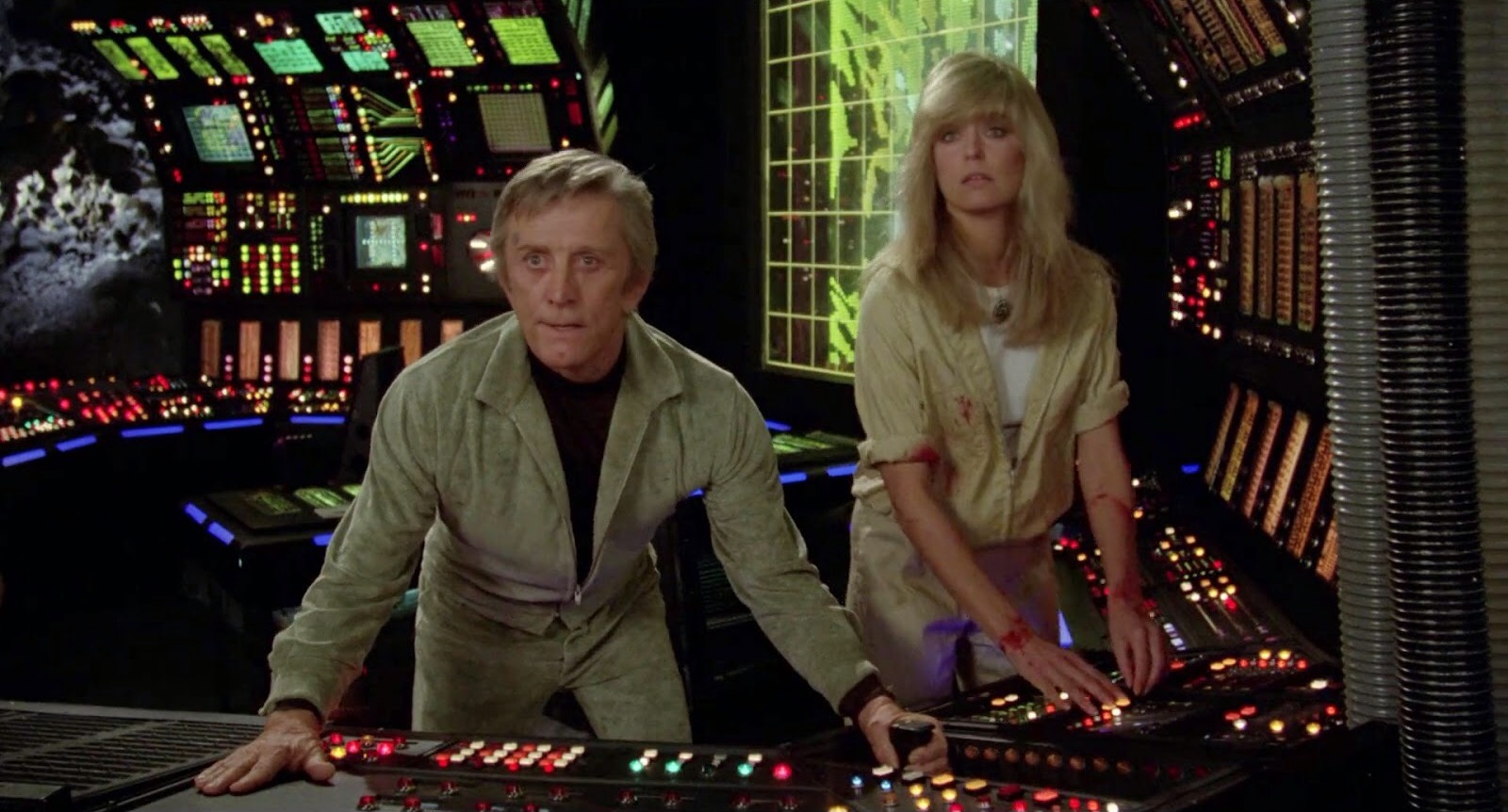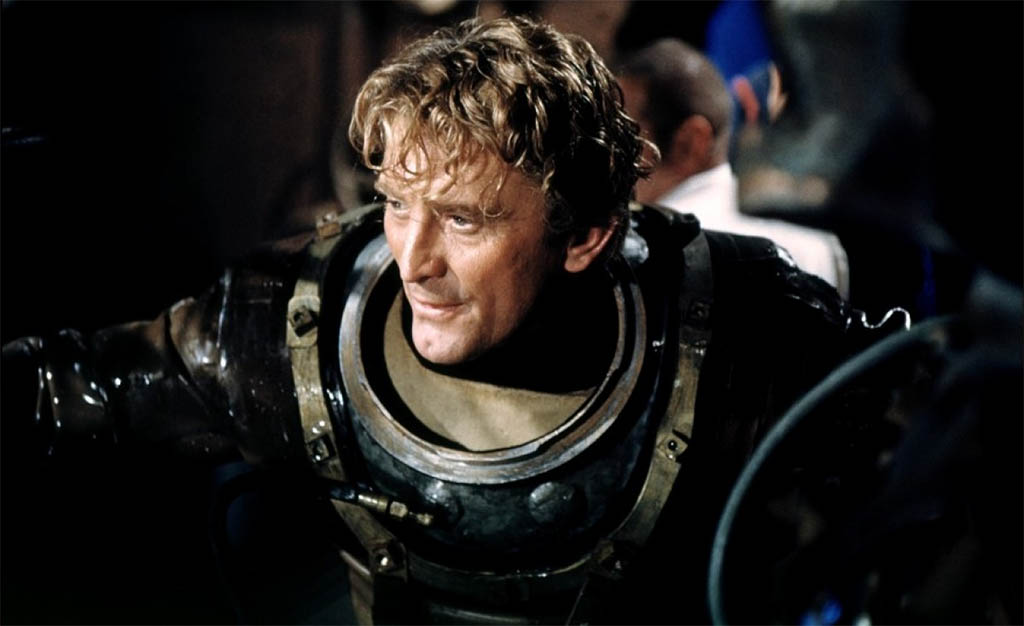
One of the greatest stars of Hollywood, Kirk Douglas, has passed away at 103 years old. Known for such films as Ace in the Hole (1951), Paths of Glory (1957) and Spartacus (1960), Douglas had one of his biggest successes in 1955 with the science fiction film 20,000 Leagues under the Sea. Although a hugely popular actor, Douglas perhaps felt he was missing out on the real top parts in the business at the time. Knowing the film would be a thundering success, Douglas came to Disney with a list of demands to enhance his pull as a leading man for future movies. In the opening scenes of San Fransisco he insisted to be courted by two girls at the same time. He demanded a chance to sing in the movie, resulting in the god-awful faux-shanty A Whale of a Tale on the deck of a ship soon to be sunk by the Nautilus, and made director Fleischer add more scenes of him fighting. Well, you don’t say no to Kirk Douglas. After all, he was the man often credited with breaking the practice of Hollywood blacklisting in 1960.
This was during the McCarthy communist scare, when, in 1950, ten Hollywood members of the Communist party were jailed for refusing to cooperate with the authorities and name other members of the party in front of Congress. One of these so called Hollywood Ten was merited screenwriter Dalton Trumbo, who was one of around 500 people, including Charlie Chaplin, Edward Dmytryk, Orson Welles, Lena Horne and Lloyd Bridges, who were black- or greylisted in the fifties. Still, Trumbo wrote or co-wrote at least 18 films between 1947 and 1950, uncredited or under pseudonym, including the pioneering SF movie Rocketship X-M (1950) and the hugely successful Roman Holiday (1953) – which was awarded with an Oscar for best screenplay.
Douglas, who was the star of the upcoming Stanley Kubrick movie Spartacus (1960), is credited with hiring Trumbo to rewrite its script. His involvement was an open secret, as a gossip columnist outed him as the writer in a column in 1959. As the story goes, or as Douglas has himself written in his autobiographies, it was he who took the decision not only to hire Trumbo but also give him official credit for his work on-screen. Which Universal did. This was more or less the final nail in the coffin for the blacklist, even if Douglas in his later years has perhaps exaggerated the role he played in breaking the practice. This was a process that had been happening for some years already, and directors like Otto Preminger and Cecil B. DeMille had openly hired and credited blacklisted writers earlier. In fact, when Otto Preminger had openly announced he was hiring Dalton Trumbo to write his next film, Exodus – a year before Douglas gave him on-screen credit – it met with very little opposition in Hollywood. And according to Trumbo’s family, it was actually producer Edward Lewis’ idea to give Trumbo screen credit – and Universal approved of it only after polling cinema goers and given the thumbs up.

“Gritted teeth, an adamantine dimpled jaw and a voice sounding as if it came through a meat grinder: for a postwar movie generation Kirk Douglas, who has died aged 103, was the definition of macho.”, writes Financial Times in an obituary. It is from such macho roles, as the boxer in Champion (1949), the two-faced reporter of Ace in the Hole, the army officer of Paths of Glory or the gladiator of Spartacus that we remember Kirk Douglas. What he is not remembered as is a science fiction staple. However, for a leading male actor of the forties and fifties, he appeared in, or produced, a surprising number of SF movies. Not a ton, but certainly more than, say, Gregory Peck or Cary Grant. He co-produced the claustrophobic John Frankenheimer pic Seconds (1960), starring Rock Hudson, and became one of the many actors two have taken on the dual title role of Dr. Jekyll and Mr. Hyde (1973) in a TV adaptation. He played the lead in Brain De Palma’s The Fury in 1978, a sort of pumped-up male version of Carrie, but with the CIA involved, and in 1980 he joined Martin Sheen in the time travel film The Final Countdown. That same year he starred in what was his most nerdy, all-out SF movie, a bizarre, pulpy Alien ripoff called Saturn 3, alongside other big names like Harvey Keitel and Farrah Fawcett. The AV Club describes the film like this: “A stoned Kirk Douglas fights Harvey Keitel and a robot in the weirdest Alien knockoff of the 1980s”. The movie has an 18% approval rating on Rotten Tomatoes and a 9/100 score on Metacritic. Personally, I love it.
Douglas was nominated for Oscars three times, and won an honorary lifetime achievement Oscar in 1996.
Janne Wass

Leave a reply to rdfranciswriter Cancel reply